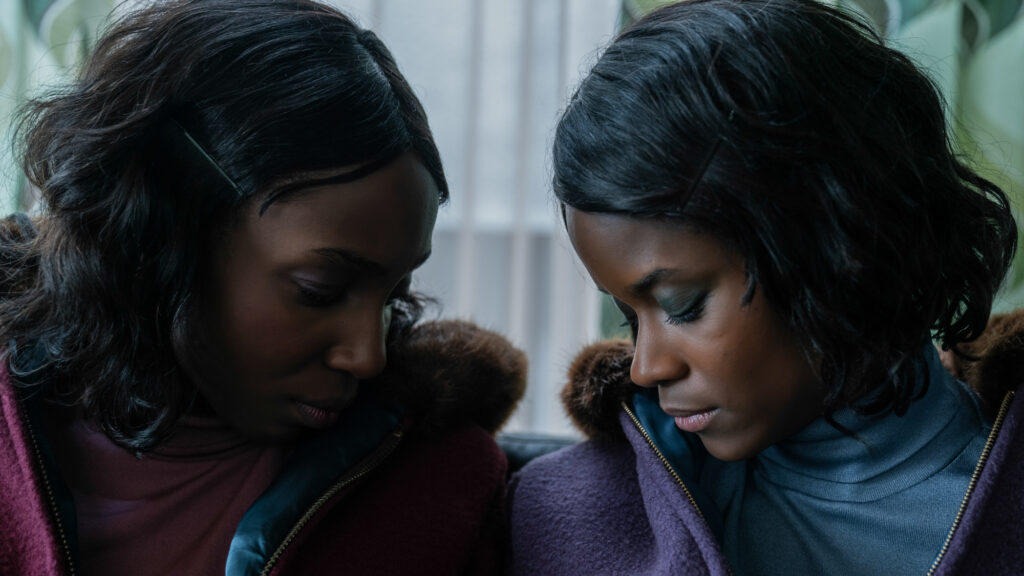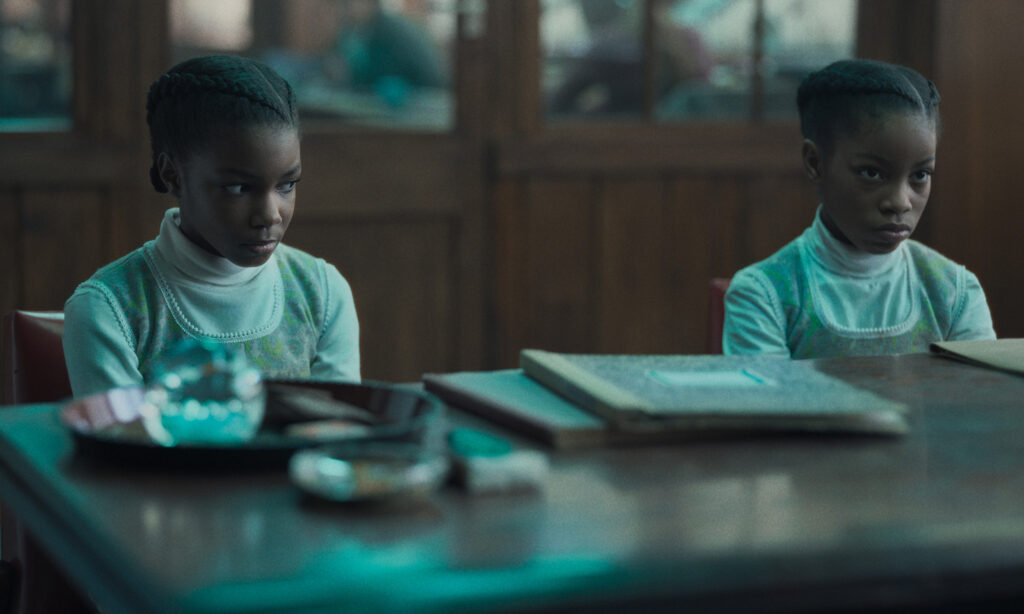September 16, 2022
by Carla Hay

Directed by Agnieszka Smoczynska
Culture Representation: Taking place in the United Kingdom from 1973 to 1993, the dramatic film “The Silent Twins” features a cast of white and black characters representing the working-class and middle-class.
Culture Clash: Based on a true story, twin sisters with a co-dependent relationship speak to each other in their own secret language, and they refuse to talk to most other people in their lives, which are affected by the twins’ stints in mental health facilities and involvement with crime and drug abuse.
Culture Audience: “The Silent Twins” will appeal primarily to people who are interested in watching well-acted, cinematic versions of “strange but true” stories, but viewers should not expect “The Silent Twins” to be a traditional biopic.

Whenever a movie is based on a true story, the filmmakers have a choice of which perspectives to focus on the most in the film. For “The Silent Twins,” the intention is to immerse viewers completely into the psyches of the real-life Jennifer Gibbons and June Gibbons, identical twins of Barbadian British heritage, who refused to speak to most people they met in their lives. Jennifer and June—who were born in 1963, and who spent most of their lives in Wales—have a tragic and bizarre story that is already familiar to many people, due to a lot of media attention, including news articles and TV documentaries.
Directed by Agnieszka Smoczynska and written by Andrea Seigel, “The Silent Twins” is based on journalist Marjorie Wallace’s 1986 non-fiction book of the same name. It’s not a conventional biopic about these real-life twins who refused to talk to most people they encountered. This uneven drama is a psychological kaleidoscope that’s worth watching for the fascinating performances by Letitia Wright and Tamara Lawrance. Wright has the role of the adult June (the more passive twin), and Lawrance has the role of the adult Jennifer (the more dominant twin).
“The Silent Twins” begins in 1973, by showing the twins at 10 years old. The childhood June (played by Leah Mondesir-Simmonds) and Jennifer (played by Eva-Arianna Baxter) are together in their bedroom while pretending to be radio broadcasters who are hosting their own talk show. It’s soon revealed that Jennifer and June have not spoken to their family members and most other people in years. The twins communicate with their family through handwritten notes and letters.
However, June and Jennifer speak to each other. In the movie, they talk quickly, often in hushed tones, and with unusual linguistic quirks, such as pronouncing the letter “s” as “sh.” In real life, the twins created their own patois way of communicating, which obviously would not work as well in a movie. In the movie, they speak English with a thick British-Caribbean accent, although some viewers might have a hard time understanding some of what is being said.
When June and Jennifer are together, they live in a fantasy world that they created. The twins have concocted imaginary characters with elaborate stories, which were often about fractured families, emotional pain and death. When they become teenagers, they write down and type out these stories, in efforts to become published authors. The movie shows that the twins continued to write into their 20s, but most of their work remained unpublished. Many of the twins’ real-life stories are incorporated into the movie as voiceover narration from the actresses portraying the twins, with stop-motion animation re-enacting the stories
The movie mentions that June and Jennifer are daughters of immigrants from the Barbados. Because the twins’ military father Aubrey (played by Treva Etienne) was an air traffic controller for the Royal Air Force, the family immigrated to England and then later moved to Wales. Aubrey’s homemaker wife Gloria (played by Nadine Marshall) is the parent who is depicted in the movie as being more disturbed than her spouse by the twins’ silence.
Jennifer and June were born in Yemen, because their father was stationed on a British military base in Yemen at the time. June and Jennifer have three siblings: older sister Greta (played by Amarah-Jae St. Aubyn), born in 1957; older brother David (played by Hubert Sylla), born in 1959; and younger sister Rosie (played by Lara Nieradzik-Vasconcelos), born in 1967. (The movie makes Rosie look a lot younger than 6 years old in the 1973 scenes.)
As pre-teen children, Jennifer and June go to a school where they are the only black students. They are bullied mercilessly and treated like outcasts and freaks. For example, there’s a scene where a boy pins down Jennifer in the school yard, spits on her, and demands that she swallow his spit. This type of bullying just makes June and Jennifer even more withdrawn from everyone else.
The school’s teachers don’t know what to do with June and Jennifer, who are intelligent, but they refuse to speak to anyone in the school. The school’s administrators are thinking about transferring June and Jennifer to a special education school if the twins’ muteness continues. The twins’ parents don’t want that to happen because they know that June and Jennifer do not have any learning disabilities.
The family is referred to child psychologist Tim Thomas (played by Michael Smiley), who makes several efforts to have a communication breakthrough with June and Jennifer. For example, he leaves two tape recorders in a room when the twins are alone together. On one tape recorder that he leaves in play mode, he asks simple pre-recorded questions that he hopes the twin will answer. (The questions include “Do you have any hobbies?,” “How would you describe your personalities?” and “What’s your favorite subject?) The other tape recorder is in recording mode, in case the twins respond to the questions.
Not surprisingly, the twins don’t respond. And things get more strained in their family, as a frustrated, angry and hurt Greta tells the twins that she done with trying to communicate with them. She also yells at the twins that they’re an embarrassment to the family. At this point in 1973, Greta is married with a child and says that the twins’ deliberate silence is so upsetting, Greta doesn’t want to come to the parents’ house anymore when the twins are there. The twins act like they don’t really care.
The biggest question that the movie doesn’t really answer is why the twins stopped talking to other people at such a young age. (News coverage and books about June and Jennifer go into more details. June and Jennifer decided to stop talking to most other people because the twins made a secret pact to become deliberately mute.) In meetings with teachers, school administrators and therapists, Aubrey and Gloria insist that all of their children were raised with love and support and were never abused. And if the twins experienced something that triggered their muteness, well, they’re not talking about it.
When they become teenagers, Jennifer and June’s antisocial behavior turns into criminal activities. They both have a crush on a troublemaking American teen named Wayne (played by Jack Bandeira), whose family lives on the same military base. Jennifer and June break into Wayne’s house when no one is there and snoop through his things in his bedroom and eat some of the family’s food.
Wayne’s parents come home and find the twins. Instead of having the twins punished for this break-in, Wayne’s parents feel sorry for June and Jennifer because they think the twins are lonely and looking for friends. Wayne’s parents let the twins hang out with Wayne, who introduces them to smoking marijuana and sniffing glue. As depicted in the movie, Wayne is one of the few people who has conversations with June and Jennifer.
Wayne also gets sexually involved with June and Jennifer (they lose their virginity to him), but it’s not a romance. He’s using them both for sex and mind games, knowing that the twins are emotionally vulnerable and are falling in love with him. In real life, June and Jennifer did have this real-life relationship. But what the movie doesn’t show is that Wayne had three brothers—Lance, Jerry and Carl—and June and Jennifer were intimately involved with Wayne, Jerry and Carl at various times.
In the movie, June and Jennifer’s involvement with Wayne leads them down a more destructive path of drug abuse and violent crime. However, the movie makes it clear that Wayne cannot be completely blamed for the twins’ bad choices, because the twins were already very troubled by the time they met Wayne. As close as June and Jennifer were, they also had a love/hate relationship with each other that would result in them getting into brutal physical fights with each other.
At the same time, June and Jennifer were so co-dependent that they couldn’t function without each other. The movie shows that when the twins are forced to separate by psychiatrists, June and Jennifer essentially have nervous breakdowns. But when the twins reunite and start living together again, their downward spiral continues for other reasons that are public knowledge but won’t be revealed in this review, so as not to give away spoiler information for people who don’t know.
Because the “The Silent Twins” movie is told only from the perspectives of June and Jennifer, the movie offers fragments of June’s and Jennifer’s lives, to replicate the fragments of memories that these twins had during their strange and traumatic existence. At one point, when the twins are at their most obsessive with each other, it’s as if their family just fades away. In the early 1980s, June and Jennifer eventually meet Sunday Times journalist Marjorie Wallace (played by Jodhi May), who has a communications breakthrough with the twins.
The tone of “The Silent Twins” is meant to keep viewers slightly off-balance, as if to replicate how the twins probably felt out of sync with most people they encountered in life. This approach to telling Jennifer and June’s story might be less interesting to watch if not for the performances of Wright and Lawrance. Aside from their skillful use of facial expressions and body language to portray these silent sisters, Wright and Lawrence (who obviously don’t look like identical twins) are also convincing in portraying twins who become so delusional, they began to think that they are the same person.
However, the twins show definite personality traits that set them apart from each other. Jennifer is the more mean-spirited of the twins, but she’s also the more talented and more prolific writer. The twins seem to be at their happiest when they’re creating stories. When they get a typewriter and are later accepted into a mail-in creative writing program, they’re ecstatic.
But the happiness in the twins’ lives turns out to be fleeting. Their drug abuse and continued muteness get in the way of the twins becoming healthy, fully functioning adults. What the movie accomplishes is showing that although the twins’ silence seemed like they were at war with the outside world, the twins were really at war with themselves and felt trapped together to the point of no return.
Focus Features released “The Silent Twins” in select U.S. cinemas on September 16, 2022.
